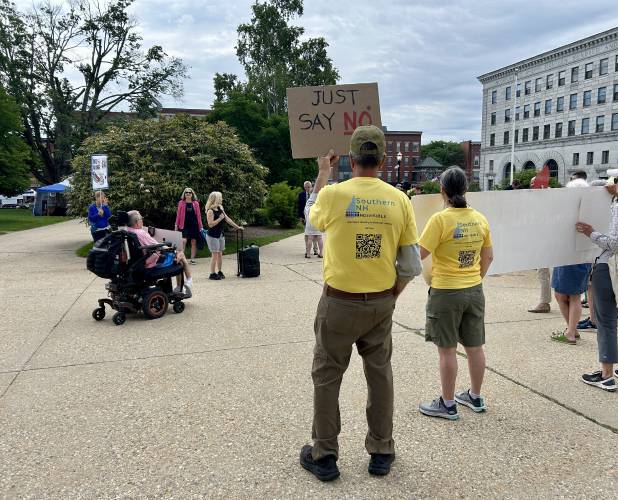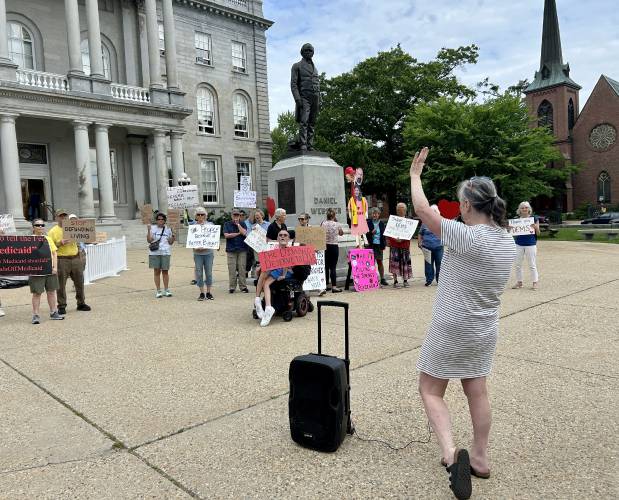Lawmakers reach deal on $16 billion two-year budget
| Published: 06-26-2025 4:16 PM |
Dave DeTour, of Weare, feels for the nearly 200,000 Granite Staters who rely on Medicaid health insurance.
Though he doesn’t count on the program himself, he showed up to the State House lawn on Thursday morning, calling on state lawmakers to reverse cuts in the state budget to the program, which provides health coverage to people with low incomes and people with disabilities. Over the past several months, advocates have repeatedly protested in Concord, decrying proposed work requirements and premiums that they argue will harm working families.
“It’s just not fair,” DeTour said.
Legislators did not, however, reverse those cuts. Soaring through the state Senate and barely squeaking by in the House of Representatives, the next state budget totals $15.9 billion over the next two years. After passing tax repeals and reaching the end of pandemic-era federal funding, the Republican-led House and Senate urged widespread budget cuts, saying the state needed to tighten its belt.
But as state lawmakers stressed a need for fiscal responsibility, local residents said reducing state spending filters costs down to them.
Liz Cote, a school board member in Franklin, said she’s feeling the squeeze of increasing education costs. Currently, the state provides about one-third of the cost to educate students in the city’s school district.
Franklin, a city with relatively low property values and tax revenue, is trying to save every penny it can spare. The school board approved a 3% overall cut to its budget this year, Cote said, which resulted in nixing 15 positions and doubling down on applications for grant funding, among other efforts.
“We’re really trying to just trim costs when it comes to things like transportation, like investing in our own van so that we can control that,” Cote said. “Just little cost savings here and there, and trying to, you know, retain the good teachers we have.”
Article continues after...
Yesterday's Most Read Articles
 Surplus seller Ollie’s enters New Hampshire, opens in Belmont
Surplus seller Ollie’s enters New Hampshire, opens in Belmont
 Riverbend to close adult mental health housing facility in Concord due to funding challenges
Riverbend to close adult mental health housing facility in Concord due to funding challenges
 Celebrating National Ice Cream Day with Richardson’s Farm: ‘Nobody else does what we do’
Celebrating National Ice Cream Day with Richardson’s Farm: ‘Nobody else does what we do’
 City officials reject the work of an outside consultant hired to lead Concord’s diversity initiatives
City officials reject the work of an outside consultant hired to lead Concord’s diversity initiatives
 Affordable townhouse expansion gets green light
Affordable townhouse expansion gets green light
Also top of mind for Cote are the Medicaid cuts, as well as New Hampshire’s ongoing housing crisis.
“I am concerned about the overall well-being of our students and their families,” Cote said. “It’s already difficult, and … everything that the budget is cutting is something that people actually really need and rely on.”
The Legislature’s budget marks the end of a showdown between the Republican-led Legislature and Gov. Kelly Ayotte, who came mere hours from fulfilling her vow to veto the budget over changes to her pension plan for police officers and firefighters.
Ayotte ultimately got her way and reached a deal with lawmakers Wednesday evening, averting a potential government shutdown and a special legislative session she’d authorized as a contingency plan.
“I am pleased we were able to reach a compromise that delivers a fiscally responsible and balanced budget for all of New Hampshire,” Ayotte said in a statement. “We have protected our most vulnerable, created an even brighter future for our children, and stood up for those who have made our state the safest in the nation.”
Last week, budget negotiators enacted a $120,000 pension cap for all police officers and firefighters – an unacceptable change for Ayotte, a former prosecutor and attorney general who has prioritized law enforcement and public safety as governor. Unions and advocacy groups had also warned that it’d spur an exodus of experienced law enforcement officers from New Hampshire.
On the final day of the session, no changes were allowed to the budget or any of the remaining bills that had gone through negotiations. Lawmakers instead revived an old bill that had died on the table earlier this year and tacked on a provision that raises the pension cap to $145,000, which only applies to those employees who weren’t vested by 2012, when a state law retroactively changed the retirement landscape.
“Certainly, we all want to recognize the contribution our first responders make to the state, but we also want to do it responsibly,” said Sen. Jim Gray, a Republican who chairs the Senate Finance Committee.
Charlotte Matherly is the statehouse reporter for the Concord Monitor and Monadnock Ledger-Transcript in partnership with Report for America. Follow her on X at @ charmatherly, subscribe to her Capital Be at newsletter and send her an email at cmatherly@cmonitor.com.










 New Hampshire committee seeks to prevent domestic fatalities like murder-suicide in Berlin
New Hampshire committee seeks to prevent domestic fatalities like murder-suicide in Berlin ‘A little piece of everything I like’: New Pittsfield barbershop brings more than a haircut to downtown
‘A little piece of everything I like’: New Pittsfield barbershop brings more than a haircut to downtown NH judge decides to pause Trump’s birthright citizenship order
NH judge decides to pause Trump’s birthright citizenship order Canterbury honors ‘real heroes’ with updated Military Veterans’ Project
Canterbury honors ‘real heroes’ with updated Military Veterans’ Project
